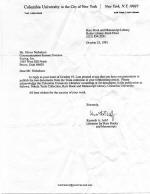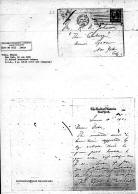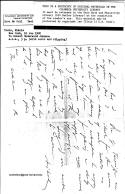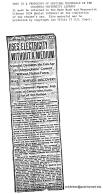|

by Oliver Nichelson
from
Tesla'sFuellessGeneratorAndWirelessPowerTransmission
Website
Nikola Tesla's "Free Energy" Documents reproduces the
inventor's 1902 letter to Robert U. Johnson about Tesla's new
energy generator that "would not consume fuel".
This letter was found in the Tesla
Collection at Columbia University Library when attending the
IEEE Tesla Symposium in New York in January 1976.
This letter will come to be considered
as important in the history of electrical science as the papers of
Franklin, Faraday and Maxwell.
While in college, Nikola Tesla
claimed it should be possible to operate an electrical motor
with-out sparking brushes. He was told by the professor that such a
motor would require perpetual motion and was, therefore, impossible.
In the 1880's he patented the alternating current generator, motor,
and transformer we use today.
Ten years after virtually inventing modern electrical technology,
Tesla claimed he developed a generator that would not "consume any
fuel." Such a generator would not have a conventional source of
energy such as oil, coal or falling water. This new generator would
get energy from what he called the "ambient medium."
He described this source in 1933:
This new power for the driving of
the world's machinery will be derived from the energy which
operates the universe, the cosmic energy, whose central source
for the earth is the sun and which is everywhere present in
unlimited quantities.
For nearly 100 years researchers have
sought the design for Tesla's "free energy" generator. Clues, in
Tesla's own handwriting, to the nature of the device and how it
operated have been uncovered.
On June 9th, 1902, both the New York Times and the New York Herald
carried a story of a Clemente Figueras, a "woods and forest
engineer," in the Canary Islands who invented a device for
generating electricity without burning any fuel. What became of
Figueras and his fuelless generator is not known, but this
announcement in the paper prompted Tesla to send a clipping of the
Herald story in a letter to his friend Robert Underwood Johnson,
editor of Century Magazine.
In this letter, a part of the Nikola Tesla Collection, at
Columbia University Library, Tesla claimed he had already
developed such a generator and to have revealed the underlying
physical laws.1
In the three-page letter Tesla states
that he suggested such a generator in his Century magazine article,
and that he has worked on such a design for sometime.
|
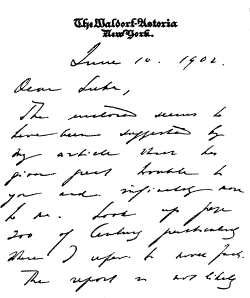 |
June 10, 1902
Dear Luka,2
The invention seems to
have been suggested by
my article which has
given great trouble to
you and infinitely more
to me. Look up page
200 of Century particularly
where I refer to novel facts.
The report is not likely |
|
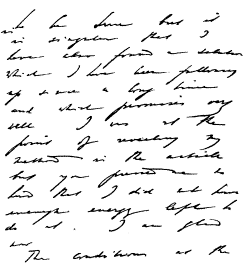 |
to be true but it
is singular that I
have also found a solution
which I have been following
up since a long time
and which promises very
well. I was at the
point of revealing my
method in the article
but you pressed[?] me to
find[?] that I did not have
enough energy left to
do it. I am glad
now.
The conditions at the |
|
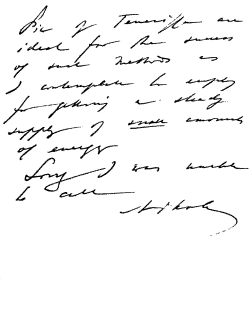 |
Pic of Teneriffe are
ideal for the success
of such methods as
I contemplate to employ
for getting a steady
supply of small 3
amounts
of energy.
Sorry I was unable
to call.
Nikola |
Tesla once called the June 1900
Century article the most important he had written. The "novel
facts" citation mentioned in the letter is found on page 200 of
the article in the first column, next to the last paragraph,
first sentence.4
Discussion of the "novel facts" just
precedes the article's subsection dealing with a,
"'Self-Acting’ Machine...
Capable... of Deriving Energy From the Medium."
A careful examination of the article
reveals the inventor believed his design for an electrical
generator which is its own prime mover, that is, does not
"consume any fuel," would not violate the energy conservation
principle.
Tesla believed, rather, that his
design transformed one form of energy into another.5
Notes
-
The Tesla-Johnson letter and
Herald clipping are used with permission of the Nikola Tesla
Collection, Rare Book and Manuscript Library, Columbia
University, New York City.
-
The nickname Tesla gave to
Johnson refers to "Luka Filipov... a legendary Serbian hero
he admired..." Margaret Cheney, Tesla: Man Out of Time,
Dell, 1983, pg. 83.
-
Underlined in the manuscript.
Tesla's attitude was that any amount of power less than that
needed for a good sized city was "small."
-
The page numbering in the
original article differs from the reproduction in the
Belgrade Lectures, Patent, Articles. In the reproduction,
page 200 of the magazine corresponds to pages A-138 and
A-139.
-
An analysis of the inventions
intended by Tesla in this letter is found in: Oliver
Nichelson, "Nikola Tesla's Later Energy Designs," IECEC,
26th Proceedings, Am. Nuclear Society, Vol. 4, pp. 439-444,
1991.
|

